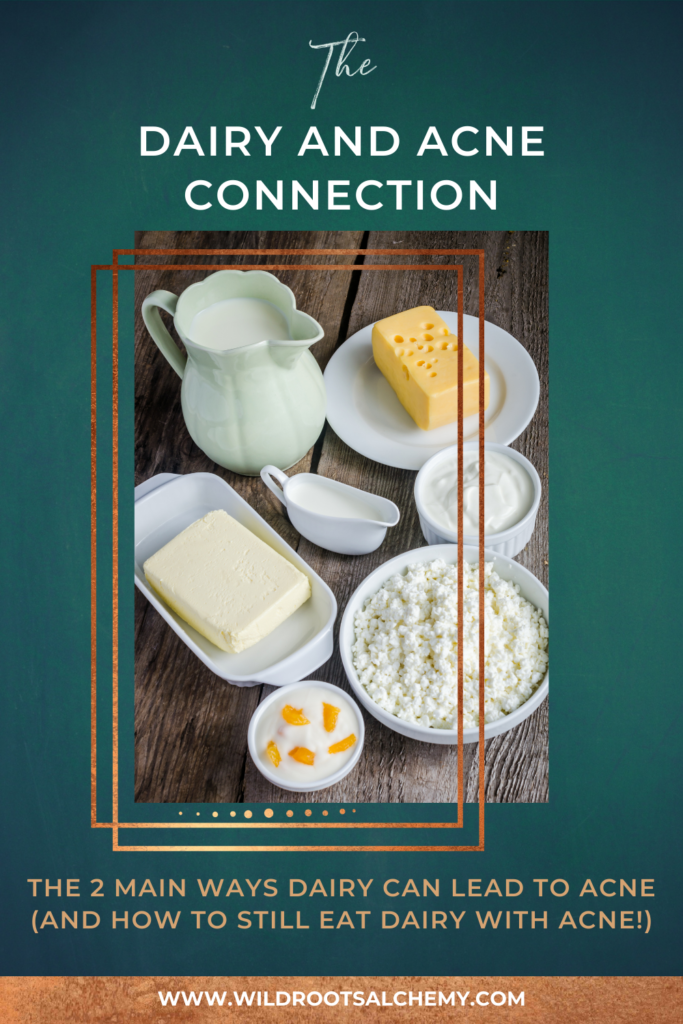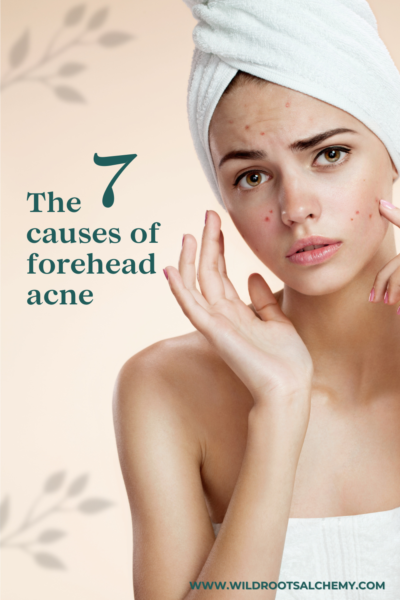
If you’ve ever searched the internet for how to heal your acne, it’s likely you’ve come across one of the most popular recommendations: “Cut dairy out of your diet!”
Dairy has long been associated with acne development, but it’s a little more complex than just “dairy causes acne.” Like most things (hormones included), dairy is a trigger, not the root cause. You should be able to eat dairy in moderation without breaking out!
So why are some people able to eat dairy without breaking out and others do?
First off, let’s discuss the 2 main mechanisms by which dairy can lead to acne: blood sugar dysregulation and digestive impairment.
#1: Blood Sugar Dysregulation
The primary mechanism by which dairy leads to acne is by increasing insulin secretion and insulin-like growth factor 1 (IGF-1), which are known to increase androgens and sebum production, as well as inflammation…and you guessed it, this is all a perfect recipe for acne formation.
Yet the key piece there is insulin. Insulin is secreted when blood sugar rises. High insulin levels are associated with increased androgen production and higher levels of inflammation.
Essentially, it all comes down to blood sugar dysregulation.
If you’re prone to blood sugar dysregulation, elevated insulin levels, or insulin resistance, your metabolic function is compromised, and metabolic dysfunction and insulin resistance are highly correlated with acne.
If your blood sugar levels don’t fluctuate widely and stay within a healthy range, dairy usually won’t be problematic. Having balanced blood sugar and insulin levels entails eating a healthy nutrient-dense diet, avoiding refined/processed carbohydrates, exercising, getting good sleep, and managing your stress well. When you’re eating a healthy diet, your blood sugar and insulin levels are balanced, you’re managing your stress well, and you’re not inflamed, then dairy can usually be tolerated in moderation, even if you’re acne-prone.
However, if your blood sugar levels are off and you mix dairy with a pro-inflammatory Standard American Diet, you’re creating even more inflammation and blood sugar dysregulation, which can result in acne.
If you’re eating healthy and dairy is still triggering your acne, make sure that you’re eating organic dairy products. Conventional dairy is loaded with more insulin-raising compounds, including naturally-occurring growth hormones, stress hormones, and often added synthetic growth hormones like rBST.
I myself can eat dairy from time to time, but when I”m not eating or sleeping well, or managing my stress well, dairy can break my skin out. However, lots of refined or simple carbohydrates (like baked goods) or too much alcohol will do the same, because it’s not really about the dairy; it’s about blood sugar dysregulation!
#2: Digestive Impairment
Dairy can also lead to acne because of digestive issues like lactose intolerance. Lactose intolerance is when your small intestine doesn’t produce enough lactase, an enzyme needed to digest lactose (a sugar found in dairy).
Lactose intolerance is actually a fairly normal occurrence, as most adults lose the ability to adequately digest lactose as we age since we no longer require human milk to grow. So if you can’t digest dairy all that well, it’s not something to be concerned about, although it can lead to digestive symptoms like abdominal cramps, bloating, and diarrhea.
If you suspect that lactose intolerance may be an issue for you, you could try digestive enzymes with lactase and see if that helps your digestive symptoms and acne. However, if the dairy is also contributing to blood sugar dysregulation, enzymes aren’t going to help with that.
Enzymes, of course, are just a band-aid solution. You’ll need to address any underlying issues that are contributing to gut inflammation and poor digestion. And if lactose intolerance is your issue, you’ll need to minimize your dairy consumption to a level that your gut can handle.
Dairy is Dose-Dependent
A little dairy may or may not cause acne, but a LOT of dairy will often trigger more acne. This is because more dairy equals more insulin secretion, and therefore increased androgen and sebum production.
This is different than gluten. Gluten sensitivities are often antibody-driven, and are typically associated with IgG or IgA delayed hypersensitivity reactions (meaning that immune-mediated symptoms usually develop 12-24 hours after ingestion). In these cases, even just a little bit of gluten will cause an immune response and can result in inflammatory acne.
Unlike dairy, which is dose-dependent, gluten is pretty much an all-or-nothing thing if it’s triggering your acne, at least until your gut has healed and your immune system no longer reacts to gluten. I’m sorry to break it to you!
Do you suspect that dairy is triggering your acne?
If you aren’t sure if dairy is triggering your acne, eliminate it completely (including milk, cheese, and butter) for 4-6 weeks, then have a dairy party for 3 whole days! Reintroduce at least one dairy product at every meal for 3 days in a row and monitor your skin for any changes.
Remember, organic dairy is best! And finding a local organic dairy farmer is even better.
For some people, conventional dairy triggers acne, while organic dairy does not. Others may also notice that while cow’s milk leads to pimples, they’re fine with goat or sheep milk. Explore your options and see what works for you!





